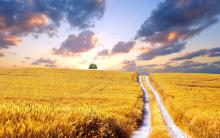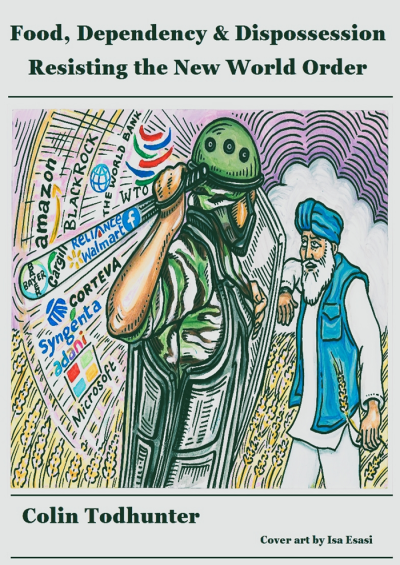
All Global Research articles can be read in 51 languages by activating the “Translate Website” drop down menu on the top banner of our home page (Desktop version).
To receive Global Research’s Daily Newsletter (selected articles), click here.
Visit and follow us on Instagram at @globalresearch_crg and Twitter at @crglobalization. Feel free to repost and share widely Global Research articles.
***
On Monday, 14 March, UN Secretary-General Antonio Guterres warned of a “hurricane of hunger and a meltdown of the global food system” in the wake of the crisis in Ukraine.
Guterres said:
“Food, fuel and fertilizer prices are skyrocketing. Supply chains are being disrupted. And the costs and delays of transportation of imported goods – when available – are at record levels.”
He added that this is hitting the poorest the hardest and planting the seeds for political instability and unrest around the globe.
Poorer countries had already been struggling to recover from the lockdowns and the closing down of much of the global economy. There is now rising inflation and interest rates and increased debt burdens.
Ukraine is the world’s largest exporter of sunflower oil, the fourth largest exporter of corn and the fifth largest exporter of wheat. Together, Russia and Ukraine produce more than half of the world’s supply of sunflower oil and 30% of the world’s wheat. Some 45 African and least-developed countries import at least a third of their wheat from Ukraine or Russia with 18 of them importing at least 50%.
Prior to the current crisis, prices for fuel and fertilizer had been rising. It was clear before COVID and the war in Ukraine that long global supply chains and dependency on (imported) inputs and fossil fuels made the prevailing food system vulnerable to regional and global shocks.
The coronavirus lockdowns disrupted transport and production activities, exposing the weaknesses of the system. Now, due to a combination of supply disruption, sanctions and Russia restricting exports of inorganic fertilisers, the global food regime is again facing potential turmoil, resulting in food price increases and possible shortages.
Aside from it being a major producer and exporter of natural gas (required for manufacturing certain fertilizers), Russia is the world’s third-largest oil producer and the world’s largest exporter of crude.
The fragility of an oil-dependent globalised food system is acutely apparent at this particular time, when Russian fossil-fuel energy supplies are threatened.
Writing in 2005, Norman J Church stated:
“Vast amounts of oil and gas are used as raw materials and energy in the manufacture of fertilisers and pesticides and as cheap and readily available energy at all stages of food production: from planting, irrigation, feeding and harvesting, through to processing, distribution and packaging. In addition, fossil fuels are essential in the construction and the repair of equipment and infrastructure needed to facilitate this industry, including farm machinery, processing facilities, storage, ships, trucks and roads.”
The Russia-Ukraine conflict has also affected global fertilizer supply chains, with both countries moving to suspend their fertilizer exports. The major markets for Russian fertilizers include Brazil and the EU and US. In 2021, Russia was the largest exporter of urea, NPKs, ammonia, urea/ammonium nitrate solution and ammonium nitrate and the third-largest potash exporter. Fertilizer prices for farmers have spiked and could lead to an increase in food costs.
It all indicates that regional and local community-owned food systems based on short(er) food supply chains that can cope with future shocks are required. How we cultivate food also needs to change.
A recent article on the Agricultural and Rural Convention website (ACR2020) states:
“What we urgently need now to invest in is a new local and territorial infrastructure for food production and processing which transforms the agro-industrial food system into a resilient decentralized food supply system. The war in Ukraine reveals the extreme vulnerability of food supply, far from the food security of actual food sovereignty.”
The agri-food and global trade system is heavily reliant on synthetic fertilizers and fossil fuels. However, agroecological and regionally resilient approaches would result in less dependency on such commodities.
The 2017 report Towards a Food Revolution: Food Hubs and Cooperatives in the US and Italy offers some pointers for creating sustainable support systems for small food producers and food distribution. These systems would be based on short supply chains and community-supported agriculture. This involves a policy paradigm shift that prioritises the local over the global: small farms, local markets, renewable on-farm resources, diverse agroecological cropping and food sovereignty.
An approach based on local and regional food self-sufficiency rather than dependency on costly faraway imported supplies and off-farm (proprietary) inputs.
The 2020 paper Reshaping the European Agro-food System and Closing its Nitrogen Cycle says an organic-based, agri-food system could be implemented in Europe that would reinforce the continent’s autonomy, feed the predicted population in 2050 and allow the continent to continue to export cereals to countries which need them for human consumption.
The question is how can this be achieved, especially when influential agribusiness and retail conglomerates regard such an approach as a threat to their business models.
The 2021 report A Long Food Movement: Transforming Food Systems by 2045 offers useful insights. Authored by ETC Group and the International Panel of Experts on Sustainable Food Systems (IPES), the document says grassroots organisations, international NGOs, farmers’ and fishers’ groups, cooperatives and unions need to collaborate more closely to transform financial flows, governance structures and food systems from the ground up.
During times of war, sanctions or environmental disaster, systems of production and consumption often undergo radical transformation. If the past two years have told us anything, it is that transforming food systems is required now more than ever.
*
Note to readers: Please click the share buttons above or below. Follow us on Instagram, @globalresearch_crg and Twitter at @crglobalization. Feel free to repost and share widely Global Research articles.
Renowned author Colin Todhunter specialises in development, food and agriculture. He is a Research Associate of the Centre for Research on Globalization (CRG) in Montreal.
 Read Colin Todhunter’s e-Book entitled
Read Colin Todhunter’s e-Book entitled
Food, Dispossession and Dependency. Resisting the New World Order
We are currently seeing an acceleration of the corporate consolidation of the entire global agri-food chain. The high-tech/big data conglomerates, including Amazon, Microsoft, Facebook and Google, have joined traditional agribusiness giants, such as Corteva, Bayer, Cargill and Syngenta, in a quest to impose their model of food and agriculture on the world.
The Bill and Melinda Gates Foundation is also involved (documented in ‘Gates to a Global Empire‘ by Navdanya International), whether through buying up huge tracts of farmland, promoting a much-heralded (but failed) ‘green revolution’ for Africa, pushing biosynthetic food and genetic engineering technologies or more generally facilitating the aims of the mega agri-food corporations.














